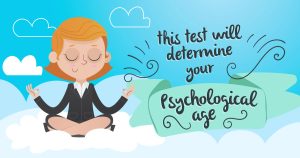Discovering your mental age can be an enjoyable and enlightening experience that unveils a different perspective on your cognitive development. It opens up a new world of self-awareness, allowing you to understand your thought patterns, emotional maturity, and intellectual capacity in a deeper manner. This process is not about judging or categorizing individuals, but rather, it’s about understanding oneself better, leading to personal growth and development.
Mental age is a fascinating concept that goes beyond chronological age, revealing our mental maturity and cognitive abilities. It’s not unusual to find individuals who are young in years but display wisdom beyond their age, or conversely, adults who maintain a childlike wonder and vivacity. The exploration of one’s mental age can be a fun journey, much like a game where you encounter new aspects of yourself that you may not have been previously conscious of. It helps to shed light on how we process information, make decisions, and respond to different situations in life.
Taking a mental age test can be an insightful journey into your psyche. These tests are designed by psychologists and are based on factors like emotional intelligence, social intelligence, creativity, and problem-solving skills, among others. It’s fascinating to see how these aspects interplay and contribute to our mental age. It’s crucial, however, to remember that these tests are not definitive or absolute. They are tools designed to provide some insight and stimulate self-reflection, not to dictate who you are or what you should be.
The discovery of your mental age can also offer a sense of affirmation. If the results align with your self-perception, it can validate your understanding of yourself, boosting your confidence and self-esteem. At the same time, if it doesn’t match, it can serve as a starting point for introspection, leading to self-improvement and personal growth.

Moreover, understanding your mental age can help you connect better with people around you. It can give you a glimpse into why you may relate better to certain age groups or why you feel out of place among your peers. This awareness can improve your relationships by enabling you to communicate more effectively and empathize more deeply with others.
The journey to discovering your mental age can indeed be fun and insightful, almost akin to a treasure hunt, where the treasure is a deeper understanding of oneself. It’s a journey that encourages self-exploration, triggers introspection, and fosters personal growth. It’s a journey that can make you more self-aware, more empathetic, and ultimately, more in tune with yourself.
In conclusion, discovering your mental age is not just about finding a number that represents your cognitive abilities. It’s about embarking on a journey of self-discovery, understanding your strengths and weaknesses, and using this knowledge to become a more self-aware, empathetic, and mature individual. It’s about realizing that age is not just a number, but a reflection of our mental and emotional maturity. So go ahead, take the plunge, and embark on this fun and insightful journey of discovering your mental age. You might be surprised by what you find.
Enjoy Quizzes More by Sharing with Friends
Quizzes can be entertaining and educational, providing a fun and interactive way to test one’s knowledge on a variety of topics. But did you know that the enjoyment derived from quizzes can be significantly increased by sharing them with friends? Sharing quizzes with friends not only adds a competitive element to the activity, but it also fosters a sense of camaraderie and team spirit. It allows us to challenge each other, learn new things, and laugh together at surprising results. By sharing quizzes, we can discuss the questions, compare our answers, and even debate on different topics. This social interaction enhances the quiz-taking experience, making it more dynamic and enjoyable.
In addition, sharing quizzes can also serve as a great conversation starter, helping to break the ice and stimulate engaging discussions among friends. It can also be a means of bonding, as it allows us to understand each other’s perspectives, interests, and personalities. So next time you come across an interesting quiz, don’t forget to share it with your friends. After all, quizzes are not just about answering questions, they are also about sharing knowledge, creating memories, and building relationships.
Overview of Common Questions
An overview of common questions often involves a wide range of topics and subjects. They can span from simple queries about day-to-day activities to more complex issues related to science, mathematics, philosophy, or technology. Common questions may include inquiries about health, such as nutrition or exercise routines; matters related to personal development, like how to improve communication skills or handle stress; or practical questions about using household appliances or troubleshooting computer issues. They can also involve more abstract concepts such as the origin of the universe, the nature of consciousness, or the meaning of life.
Questions can be factual, seeking specific information, or they can be open-ended, inviting discussion and multiple perspectives. Whether they are asked in a classroom, a workplace, an online forum, or a social gathering, common questions are a fundamental part of human communication and knowledge exchange. They drive curiosity, facilitate learning, and foster understanding and empathy among individuals. Understanding the nature and scope of common questions can help in various fields – educators can better design their curriculum to address common queries, businesses can improve their products and customer service, and individuals can enhance their problem-solving and critical thinking skills. Thus, an overview of common questions is not just a list of queries; it’s a window into the collective human mind, its interests, concerns, and thirst for knowledge.
Explore Additional Quizzes
Exploring additional quizzes can be a stimulating and enlightening experience. Quizzes offer a fun and engaging way to test one’s knowledge and understanding of various topics. They can cover a vast array of subjects, from science and history to pop culture and sports. Delving into additional quizzes can not only broaden one’s knowledge base but also hone critical thinking skills. They often challenge an individual to think outside of the box and approach questions from different angles. For educators, quizzes can serve as an effective tool to assess a student’s comprehension and retention of the material. They can also help identify areas where a student may need additional support or instruction.

Moreover, additional quizzes can be used as a form of interactive content in digital marketing strategies. They can keep an audience engaged with a brand or website, drive traffic, and generate leads. For individuals preparing for competitive exams or job interviews, taking extra quizzes can be an excellent way to practice and prepare. It can help them get a feel for the types of questions they might encounter and understand how to best approach them. Overall, exploring additional quizzes has numerous benefits and can be an enjoyable way to learn and grow.
Subscribe to the Official wikiHow Quiz Newsletter
The Official wikiHow Quiz Newsletter is a fantastic source of both knowledge and entertainment. By subscribing to this newsletter, you will have access to a plethora of quizzes that cover a wide range of topics. Not only does it test your knowledge, but it also helps you learn new things in an engaging and enjoyable manner. Whether you’re passionate about food, travel, technology, or health, there is always something for everyone. This newsletter, delivered straight to your inbox, will not only challenge your intellect but also stimulate your curiosity. It’s an excellent way to keep your brain active and healthy. The Official wikiHow Quiz Newsletter presents its quizzes in an easy-to-understand format, making it a joy for people of all ages.
And the best part is that you can take these quizzes at your own pace, whenever you have some free time. This isn’t a test with a deadline or grades; it’s purely for your enjoyment and learning. So, if you love expanding your knowledge and challenging yourself, subscribing to the Official wikiHow Quiz Newsletter would be a smart move. It’s a treasure trove of information and fun waiting for you in your inbox. Plus, it’s completely free! All you need to do is sign up, and you will be part of an ever-growing community of quiz enthusiasts. Don’t miss out on this opportunity to learn something new every day in the most entertaining way possible!
The Evolution and History of Mental Age Tests
The evolution and history of mental age tests have seen significant developments since their inception in the late 19th century. Initially, these tests were designed to identify children who required specialized educational support. Alfred Binet, a French psychologist, and his colleague Theodore Simon developed the first mental age test in 1905 – the Binet-Simon scale. The test was designed to measure intellectual development in children, and it compared a child’s performance to the average abilities of other children at different age levels. Later, in 1916, Lewis Terman, an American psychologist, revised the Binet-Simon scale and created the Stanford-Binet Intelligence Scale, which introduced the Intelligence Quotient (IQ) – a ratio of a child’s mental age to their chronological age, multiplied by 100.
As the 20th century progressed, the field of psychology expanded, and the mental age tests evolved. David Wechsler developed the Wechsler Intelligence Scale for Children (WISC) in 1949. Unlike the Stanford-Binet test, the WISC focused not only on verbal abilities but also nonverbal, performance-based skills. This holistic approach to intelligence testing was a significant shift and marked a fundamental change in the understanding of intelligence.
However, the concept of mental age has also faced criticism. Some argue that it oversimplifies the complex nature of human intelligence by assigning a single number score. Others point out that these tests often fail to consider cultural, social, and language differences, which can result in biased outcomes. Despite these criticisms, mental age tests have continued to evolve. Modern psychometric tests now focus on specific areas of cognitive function, such as memory, attention, and problem-solving skills. These tests aim to provide a comprehensive understanding of an individual’s cognitive abilities rather than simply assigning a mental age. The evolution of mental age tests thus reflects the broader development of psychology, from a focus on classification and measurement to a more nuanced understanding of human cognition and individual differences.
